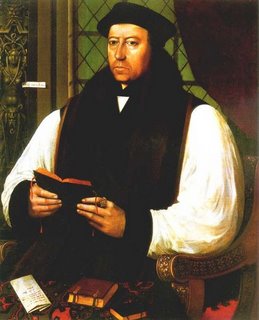
A few weeks ago I participated in an academic conference. It was interesting – even fun, but too much of that sort of thing drives me to distraction. To unwind and sooth my mind after far, far too much immersion in theoretical jargon, I decided to escape into the magnificent prose of Thomas Babington Macaulay’s History of England From the Accession of James II. Previously I had only read the famous third chapter of his first volume – you know, the one in which he effortlessly guides his reader through a description of the “State of
It’s going to be a long journey, not because the work is difficult – it’s perfectly lucid – but because it’s so damn good. I keep stopping to admire the prose and the mind that crafted it and every few pages I run across an idea or observation that makes me stop and think…, hard. So it’s slow going, but very much worth the effort.
One of the passages that stopped me for a while was Macaulay’s description of Thomas Cranmer, Archbishop of Canterbury during the reigns of Henry VIII and Edward VI, who was martyred under Bloody Mary. He did more than any other individual to shape the character of the Church of England in its early years.
Macaulay describes Cranmer thusly:
He was at once a divine and a courtier. In his character of divine he was perfectly ready to go as far in the way of change as any Swiss or Scottish Reformer. In his character of courtier he was a desirous to preserve that organization which had, during many ages, admirably served the purposes of the Bishops of Rome, and might be expected now to serve equally well the purposes of the English Kings and of their ministers. His temper and his understanding eminently fitted him to act as mediator. Saintly in his professions, unscrupulous in his dealings, zealous for nothing, bold in speculation, a coward and a timeserver in action, a placable enemy and a lukewarm friend, he was in every way qualified to arrange the terms of the coalition between the religious and the worldly enemies of Popery.
The compromise that emerged, largely due to Archbishop Cranmer’s efforts, was the Church of England, comprised in its constitution, its doctrines, and its services in such a way as to allow scope to a wide range of practices and beliefs. Although Thomas Cranmer did not himself survive the religious turmoil of his times, the Church of England did, largely because of the flexibility imbued in it by this inconstant man.
Macaulay’s point is a simple one, yet one that all too often escapes us – that in times of intense ideological and political conflict the politics of principle can be terrifyingly destructive. In such perilous times it may be appropriate to look for leadership, not to zealous men of strong principle, but to those who are willing to compromise nearly anything. Only such men as these can lead the way to a settlement that, however ideologically inconsistent and doctrinally dissatisfying, can provide the basis for long-term accommodation.
No comments:
Post a Comment